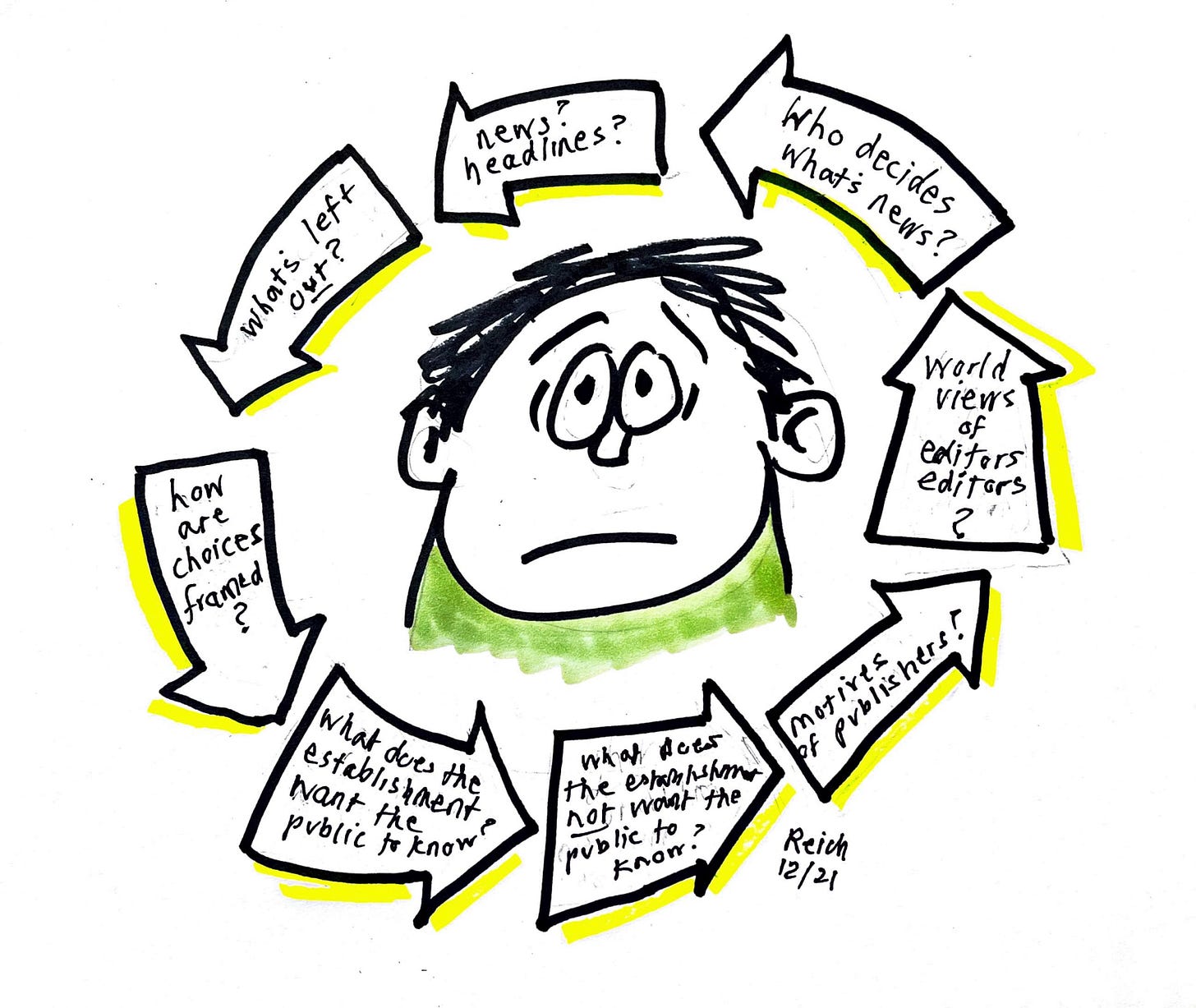Trying to find something to discuss today besides the latest war news and the latest right-wing conspiracy thinking. Just one linked item today, I think, then some endpiece items.

(Graphic by Robert Reich.)
Here’s a counter-intuitive piece by Robert Reich, as liberal or progressive an economist as one could want, and a professor for many years at UC Berkeley. Here is a piece on his Substack site called Why I don’t trust the mainstream media, subtitled, “And how I keep up with the news nonetheless.” (From December, though I just saw it recently via Fb.)
I say this is counter-intuitive because it’s usually those on the right railing against the MSM. So I read this with interest. It turns out his concerns are about what I would call media literacy — understanding how the press works in general, why their priorities aren’t yours, and how you need to understand them. Not about being duplicitous, like the right-wing sites. I’ll quote a bit:
I’ve also grown a bit wary of the mainstream media –- the New York Times, Washington Post, CNN, and other dominant outlets — not because they peddle “fake news” (their reporting is usually first-rate) but because of three more subtle biases.
First, they often favor the status quo. Mainstream journalists wanting to appear serious about public policy rip into progressives for the costs of their proposals, but never ask self-styled “moderates” how they plan to cope with the costs of doing nothing or doing too little about the same problems.
A Green New Deal might be expensive but doing nothing about the climate crisis will almost certainly cost far more. Medicare for All will cost a lot, but the price of doing nothing about America’s cruel and dysfunctional healthcare system will soon be in the stratosphere.
Second, the mainstream media often fail to report critical public choices. Any day now, the Senate will approve giving $768 billion to the military for this fiscal year. That’s billions more than the Pentagon sought. It’s about four times the size of Biden’s Build Back Better bill, which would come to around $175 billion a year. But where’s the reporting on the effects of this spending on the national debt, or on inflation, or whether it’s even necessary?
Third, the mainstream media indulge in false equivalences — claiming that certain Republican and Democratic lawmakers are emerging as “troublemakers” within their parties or that extremists “on both sides” are “radicalizing each other”.
So what media does he read?
I read the Guardian, the American Prospect (which, full disclosure, I helped found thirty years ago), Mother Jones, and The Atlantic. I follow several blogs (Daily Kos and Talking Points Memo, for example). I listen to the always thoughtful Democracy Now. And I subscribe to a few newsletters (I hope you like this one and spread word of it).
But even with news sources I trust, I still ask myself: how are choices being framed? What’s being left out? What big underlying issues are being assumed away or obscured?
I see a major flaw in journalism as being about day to day issues, ignoring large term trends and threats (as in his third paragraph quoted above). But if you talk about those too often, people just tune you out, so there is no good solution.
\\\
Endpieces
Another hike today, this time in Dracena Quarry Park, in Piedmont, just a few blocks from Piedmont Park where we hiked almost a month ago. This park was smaller than I expected, with a kids’ park at the bottom of a canyon, where the quarry once was, and trails up to the top, all leading to residential streets.
We saw the film Belfast yesterday, finally, having put it off because Amazon Prime charges $19.99 to watch it (and we’ve gotten spoiled being able to see so many films for free on various streaming services, not having been in a movie theater for a full two years now). It’s a very fine film, based on writer/director Kenneth Branagh’s childhood in Belfast, as clashes between the Protestants and the Catholics broke-out. It’s a slice of life, told from the POV of a young boy, who doesn’t really understand what’s going on around him, but doesn’t want anything to change, until it has to. The child actor is very good, as is Caitriona Balfe, whom we’ve watched for years as a lead in the TV series “Outlander.” As I’m writing, the SAG Awards are on TV, and she lost in the category of supporting actress (even though hers was the biggest role in the film). She’s not nominated for an Oscar.
I’m sorry we didn’t have a chance to see it before I’d seen some of the reviews that subtly dismissed it as “Oscar bait” in the manner of Roma a few years ago, as if it were not sincere. I think it’s sincere. I especially liked some scenes near the beginning in which the boy naively wonders why the “truths” of the Catholic Church and the Protestant Church (to which his family belongs) differ, and how he should be expected which to believe.
And currently I’m working hard on my ongoing projects, the sfadb rankings and timelines, and the family photo captures. Meaning reading suspended somewhat. The project are what I’ll be remembered for, if anything.





